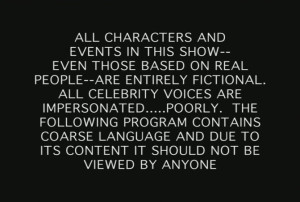I decided to make a satirical piece on reality tv. It will be a 30 minute sitcom that mocks todays reality tv shows. I want people to see how truly dramatic and superficial these shows are. Two of the sources I used were South Park and A Modern Times. Both of these films show how much sarcasm and body language can tell a story and prove a point.
Laughter and the Fine Arts
Exam 3 summary
I chose to create my own satire about Elon University. It is an article that has the style of an Onion article, but actually features more of a Hogarth styling in that it features enormous detail. I used Modern Times and A Confederacy of Dunces as ways to show how my depiction of Leo Lambert is similar. The article I created is also current so I used South Park as my example.
Exam #3 Summary
I chose the second option for my exam. I asked Pat and Jamie to create a collection of satirical poems on the transition of love throughout the years. This idea was a blend between Swift’s “A Modest Proposal” and Hogarth’s “Marriage à-la-mode.” I want these poems to tell a story, while remaining a humorous one. This topic is very interesting to me because forms of communication have completely changed due to the increase in technology. I explain other works and said exactly what I did and did not like from them–this way the direction of the poems would be very clear to them. I think that it would be very funny to make fun of how my generation communicates mainly through text and different apps. These poems would not change anything, but hopefully allow many to realize that they need to put down their phones every now and then.
Controversial Topics
South Park really likes to push limits and boundaries in each of their episodes. The show is known for its mockery of a very wide range of celebrities, public officials, and even religious figures. At the beginning of each episode, the following message is shown: “All characters and events in this show-–even those based on real people–-are entirely fictional. All celebrity voices are impersonated…..poorly. The following program contains coarse language and due to its content it should not be viewed by anyone.”  Even the disclaimer is humorous. But due to the show portraying characters based on real people, Trey Parker and Matt Stone have often been the subjects of controversy. Religious icons like Jesus Christ, Muhammad, and Buddha have all been slandered in South Park episodes, leading to a lot of retaliation from their respective religious groups. Even Tom Cruise has put his foot forward to canceling an episode that denounced Scientology as a scam. The series has always been known for its inappropriate language and physically disturbing footage. However, people seem to still enjoy and support South Park.
Even the disclaimer is humorous. But due to the show portraying characters based on real people, Trey Parker and Matt Stone have often been the subjects of controversy. Religious icons like Jesus Christ, Muhammad, and Buddha have all been slandered in South Park episodes, leading to a lot of retaliation from their respective religious groups. Even Tom Cruise has put his foot forward to canceling an episode that denounced Scientology as a scam. The series has always been known for its inappropriate language and physically disturbing footage. However, people seem to still enjoy and support South Park.
It seems that Parker and Stone are well within their rights to write and produce and portray anything they want in the show. Even with the controversial topics they are creating, Comedy Central is still approving and streaming the series on television. Do you think Parker and Stone should be allowed to produce a show that can be so hurtful to certain groups of people? Is it ok, because in the end, it’s all just comedy? Lots of celebrities have been portrayed on the show and seem to be flattered to be featured in an episode. Others threaten to sue the creators. Why do you think Comedy Central still supports South Park?
Kids being Kids
Let’s face it. There is a lot of profanity coming from the mouths of children in each episode of South Park. There is some reason behind it though. Trey Parker and Matt Stone claim that this is the way they believe young boys really talk like when they are alone from adults. Stone has gone as far to say that, “Kids don’t have any kind of social tact or etiquette, they’re just complete little raging bastards” in a response to a disapproving parent of the series. The writers are persistent in reiterating the fact that they believe the show is more about kids being kids than anything else. If you think about it, that could be true. Think about the episode, Make Love, Not Warcraft, when Stan’s dad, Randy, comes to his room to tell him to go out and socialize. Stan responds, “I am socializing, r-tard. I’m logged on to an MMORPG with people from all over the world, and getting xp with my party using teamspeak!” That may not be how a normal 4th-grader would respond to their parents, but Parker and Stone use it as a way of saying aloud what a 4th-grader might actually be thinking in a situation like that.  Also, the constant portrayal of adults in South Park adds as further evidence. When we were kids, I’m sure we all thought that adults are stupid and that we were much smarter than them. Well, that’s what the whole series is based on-looking at the world through the eyes of a 4th-grader.
Also, the constant portrayal of adults in South Park adds as further evidence. When we were kids, I’m sure we all thought that adults are stupid and that we were much smarter than them. Well, that’s what the whole series is based on-looking at the world through the eyes of a 4th-grader.
Do you think that the reasoning behind Parker and Stone’s depiction of the American 4th-grader is valid, or just plain inappropriate? There does seem to be some logic coming out of the writers’ corner as to why the boys act as cruelly and rudely as they do. Maybe this show is an outlet for what the writers were thinking about when they were boys. The characters of Stan and Kyle are actually based on Trey Parker and Matt Stone, and the friendship and bond they share. What do you think?
Quick on their Feet
Trey Parker and Matt Stone, the creators of South Park, have an interesting system of creating South Park episodes. The truth is, they only give themselves one week to write, produce, and edit each week’s episode! Comedy Central airs the show on Wednesdays, and Parker and Stone start writing next week’s episode on Thursday. Sometimes, the completed episode is sent to Comedy Central’s headquarters just a few hours before the show is supposed to air live. This practice allows Parker and Stone to satirize and joke about current events in their episodes that are fresh to the audience. In the episode Sexual Healing, the scene where Tiger Woods announces his return to golf was a reference to the actual announcement that took place during the week the episode was being written.  In Dances with Smurfs, the reference to the movie, Avatar actually referred to the future. The movie hadn’t even come out yet! The writers were simply referring to the trailer for Avatar that had been released. Needless to say, Parker and Stone are quick on their feet when it comes to writing these episodes.
In Dances with Smurfs, the reference to the movie, Avatar actually referred to the future. The movie hadn’t even come out yet! The writers were simply referring to the trailer for Avatar that had been released. Needless to say, Parker and Stone are quick on their feet when it comes to writing these episodes.
The two writers have implemented this one-week system for along time now. Do you think that this idea is revolutionary to the comedy world? Shows like Saturday Night Live and The Tonight Show are forced to use a one-week system, but Parker and Stone choose to do it for their animated series. Do you think the show could be better if they planned further ahead? What are some of the advantages and disadvantages of using this routine?
More Wheel of Fortune
A common theme that shows up throughout the novel is something we have seen before in The Roman de Fauvel. The main character, Ignatius Reilly, consistently brings up the idea of the wheel of fortune and Fortuna. While he never truly believes that his wheel is up, especially in the beginning of the book, he never tries to bring his fortune around. One example of this in the novel is on page 55 when he thinks to himself “When Fortuna spins you downward, go out to a movie and get more out of life. Ignatius was about to say this to himself; then he remembered that he went to the movies almost every night, no matter which way Fortuna was spinning.” We as readers can see his refusal to change this fortune with his jobs as well. Instead of working hard he ends up manipulating his co-workers in the Levy Factory and lying to his boss at Paradise Vendors. He even says at one point in the book that he has no control over his fortune and refuses to attempt to change. It is also interesting how he brings in the idea of a smaller wheel within the wheel saying “So we see that even when Fortuna spins us downward, the wheel sometimes halts for a moment and we find ourselves in a good, small cycle within the larger bad cycle” (76). He even goes further to say that it is possible to have smaller circles within that small cycle.
What do you think this says about his character that he refuses to change his fortune?
If it is true that one has no control over their own fortune, do you think there is any way to change fortune?
Symbols in A Confederacy of Dunces
Throughout the novel certain symbols show up and are talked about but never fully explained. Troubles for him like his faulty valve are brought up in almost every chapter. While it is never fully explained why his valve is, we as readers eventually figure out that the valve is somehow related to his digestion. While this is a huge problem for him, we as readers never learn why this became a problem and why it is not checked out. He uses it as an excuse to get out of almost anything. He uses it to alienate his mom whenever she is mean. He also uses it to guilt Mr. Gonzalez throughout his time working at Levy Pants. The valve almost becomes his crutch of never being able to be a fully functional adult. This struggle affects his entire life although his mother does not fully believe it is a problem. On page 48 they have a conversation about the valve, “’What are you doing? Are you fooling with that valve again? Nobody else got him a valve but you. I ain’t got no valve.’” “’Everyone has a valve!’ Ignatius screamed. ‘Mine is simply more developed…’” How does this interaction change your view of the “valve”?
Why do you think this is brought up in the novel?
What other consistent symbols are brought up in the novel?
Picaresque Novels
This novel is defined as a Picaresque novel because of its humorous focus on the main character Ignatius. These novels are mostly first person autobiographical following the triumphs and tribulations of the main characters life. The main character is also usually unable to hold a job and has low social class. One of the main characteristics is that the character does not develop. Ignatius stays consistently the same attitude throughout the entire novel and refuses to change even though he is unable to live a normal life because of this. Another major characteristic is satire, which can obviously be seen throughout this novel. This type of character has been around since Roman Literature and has not changed much since.
What are some other characteristics in a Picaresque novel that can be seen in A Confederacy of Dunces?
Silent, but Funny?
We have discussed the idea of comedy and laughter in different mediums throughout this class. We have seen laughter in poetry, novels, films, and in songs. Some may have more obvious humor, while others may be somewhat more subtle. Modern Times introduces a medium that we haven’t discussed yet, a silent film. Although there is one scene at the end where Chaplin speaks, this movie for the most part is silent. This is an interesting thing because sound did exist at this time and was the popular and desired thing. Yet Chaplin chose not to make this an all-out “talkie” to help protect the relativity of his character and not let his voice ruin the idea of the Tramp. Chaplin actually received some criticism for this, but obviously the film turned out fine.
So even though there are hardly any words, do you still find this film funny? Yes it may not have the witty dialogue or crude jokes that we are used to today, but it has great settings and very entertaining sequences. You can’t possibly watch the scene below and not find it funny.
http://www.youtube.com/watch?v=DfGs2Y5WJ14
I feel that fact that this scene is so comical without Chaplin speaking really shows how talented he was. He doesn’t need to use jokes, but instead, can simply use body language and his actions to create laughs. But what do y’all think? Do you find this scene as funny as I do, or do I just have a bad sense of humor? Or think currently, do you think a silent comedy could ever be successful today, or have we just become to accustom to jokes and dialogue?
